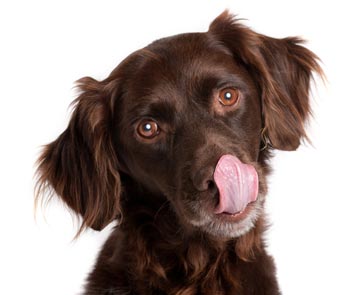Tips for Feeding a Hungry, Overweight Dog

Keeping your dog at a healthy weight can be challenging. Many dogs today are overweight, and it can increase the risk of or cause many illnesses including joint problems, heart disease, and diabetes.
If your dog is overweight, you might be having trouble figuring out how to feed her in a way that will be healthiest for her. She might be begging for food all the time, too, which doesn't make things easier. Here, we've compiled a few tricks that might help you keep your hungry dog happy while not adding to her weight problem.
First, Visit the Veterinarian
The first step in helping your overweight dog is to visit her doctor, who will help you determine what your dog should weigh, how much and what type of food is best for her current life stage and medical history, and how much exercise it is safe for her to have.
Once you have these answers, you can form the base of your dog's feeding plan and use the following tips to help you.
Feed Multiple Small Meals per Day
Depending on your schedule, it can help your dog to receive multiple small meals throughout the day rather than one or two large ones. This type of feeding can keep your dog more full and satisfied as the day goes on, so she isn't begging for treats and handouts as much.
Add Some Fibrous Vegetables
If your veterinarian OKs it, consider adding some carrots and green beans to your dog's diet. Chop them up and steam them until they're a bit soft, then let them cool and add them to your dog's food or use them as treats.
Be sure to begin adding the vegetables gradually rather than giving too many at once initially because your dog might get stomach pain if her fiber intake increases too quickly.
Save Treats for Training Time
If you can, avoid giving your dog treats unless you are having a training session. If your dog gets used to having treats throughout the day, it can be a hard habit to break. Instead, if treats are only associated with training sessions, your dog may be more attentive, learn better, and will also be working off any extra calories as she ingests them.
You May Also Like These Articles:
Dog Weight Loss: Tips For Helping Your Dog Lose Weight
How to Tell If Your Dog Needs More Exercise
Obesity in Dogs: Overview of Causes and Dangers
Hands-On Guide to Checking if Your Dog Is at a Good Weight
Can Eating Cat Litter Box Contents Make My Dog Fat?
Walking Your Dog to Help with Weight Loss
Dog Breeds More Prone to Becoming Obese
6 Causes of Unplanned Weight Loss in Dogs
Disclaimer: This website is not intended to replace professional consultation, diagnosis, or treatment by a licensed veterinarian. If you require any veterinary related advice, contact your veterinarian promptly. Information at DogHealth.com is exclusively of a general reference nature. Do not disregard veterinary advice or delay treatment as a result of accessing information at this site. Just Answer is an external service not affiliated with DogHealth.com.
Notice: Ask-a-Vet is an affiliated service for those who wish to speak with a veterinary professional about their pet's specific condition. Initially, a bot will ask questions to determine the general nature of your concern. Then, you will be transferred to a human. There is a charge for the service if you choose to connect to a veterinarian. Ask-a-Vet is not manned by the staff or owners of DogHealth.com, and the advice given should not delay or replace a visit to your veterinarian.



